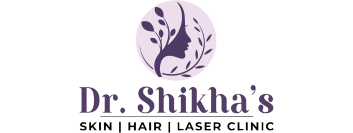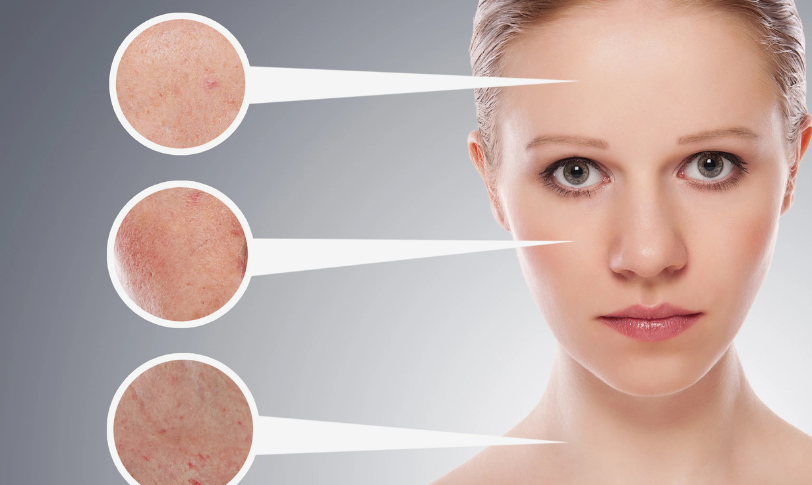Many times people ask what they are supposed to do for their skin to be healthy. Therefore, based on the kind of exposure our skin might be vulnerable to acquiring illnesses inclusive of genetic factors. At Dr. Shikha’s skin clinic, we consider early intervention very important and that the treatment should be personalized to keep your skin healthy.
In this article, you will learn 10 types of dermatological diseases and how they can be treated. The treatments are meant to provide permanent comfort and relief.
1. Acne
A pimple or acne is, in fact, one of the most common skin diseases that strike millions of people worldwide and is specifically teenagers and young people. It appears to be an earned acne wherein hair follicles clogged with each other dead skin cells and bacteria resulting in pustules, blackheads, and even cysts.
Treatment: Acne treatment suggestions consist of the following:
- Topical retinoids to BBL, to open those pores and allow the pilosebaceous units to properly function
- Chemical exfoliants like benzoyl peroxide or salicylic acid that will help to decrease oil and the effectiveness of eradicating the bacterium responsible for pimples.
- Oral antibiotics or hormonal treatments in extreme instances loader control medications
- Acne scar treatment using lasers and chemical peels for the purpose of maintaining the improvement for the longest period of time.
At Dr. Shikha’s skin clinic, we are keen to make sure that every management plan for acne is developed with respect to the skin type and the lifestyle of the patient in question.
2. Eczema (Atopic Dermatitis)
Eczema is a long term skin disease that causes skin rashes, skin redness and skin itching. They may occur on skin or the mucosal surfaces of the mouth, vagina or conjunctiva, but mostly develop on the face, hands or feet. Relapses of asthma cases are often associated with some environmental stimuli such as allergens or stress.
Treatment: Treatments may include:
- Lotions to replace the skin’s natural barrier such as moisturizers and emollients.
- To reduce inflammation, I thought that topical steroids were appropriate to use.
- Agents for medium to severe form of eczema It should be noted that in this paper we’re only concentrating on immunomodulators for more persistent eczema.
- Staying far away from substances that one may be allergic to or substances that may irritate the skin.
To ensure that patients with eczema minimize the episodes and discomfort that come with the skin conditions, Dr. Shikha’s skin and hair clinic offers proper medical treatments alongside useful advice on lifestyle changes.
3. Psoriasis
Psoriasis is a chronic autoimmune condition that accelerates the reproduction of skin cells, hence red, raised, itchy and sometimes painful patches in areas where this condition typically appears are observed. Such as elbows, knees and scalp and the lower back referred to as the lumbar region.
Treatment: Unlike other diseases that have cure, psoriasis cannot be cured but its symptoms can be managed by Dr. Shikha as a consultant by:
- Topical corticosteroids and Vitamin D Derivatives
- Light therapy (phototherapy) is used to treat the condition that causes rapid production of skin cells.
- Biologic agents such as systemic therapies for patients with psoriasis dealing with major flare-ups
- Lifestyle modifications to help to avoid the things that lead to worsening of COPD such as stress and smoking.
We at Dr. Shikha’s skin clinic would like to help patients utilize the chance in diagnosis, treatment and follow-up of psoriasis in order to allow the patient to achieve a higher quality of life.
4. Rosacea
Rosacea is a permanent skin condition that results in skin redness, exposed blood vessels and sometimes, tiny red pimples or pustules. It commonly occurs in persons with relatively light skin tone and if not treated may get worse with time.
Treatment:
- An application of topical medications to help to minimize redness and inflammation.
- Prescribed drugs to be taken orally.
- Erbium YAG laser therapy in an attempt to decrease superficial blood vessels.
- Skin care routines that cater for the sensitive skin of the human body.
Thanks to her experience, Dr. Shikha can manage rosacea so that such patients receive the best results and obtain relatively smooth skin with reduced redness.
5. Melasma
Melasma is a skin disorder that results in development of darkened pigmented patches mostly on the face region. It is common with people who are frequently outdoors especially when they are exposed to the sun as well as during pregnancy and the use of birth control pills.
Treatment: Currently, many practitioners realize that for melasma treatment to be acceptable, it has to be a multistep procedure, including:
- Topical medicines, including hydroquinone or azelaic acid
- Chemical peels that will remove and replace skin dermal cells.
- Some of the therapies that are used are the laser therapies which are used to combat pigmentation.
- Measures to minimize the skin’s sensitivity to pigmentation to avoid its aggravation
Dr. Shikha’s clinic offers non-surgical procedures to remove melasma and other skin discolorations to give you a more splendid skin tone.
6. Vitiligo
Vitiligo is a skin disorder in which the melanocytes in the skin are destroyed leading to depigmentation. It happens where cells which produce pigment called melanocytes are killed. The reasons for it are still unknown, but some theorize that it may be an autoimmune disease.
Treatment:-
- They include topical corticosteroids or immunosuppressants for regaining the pigment.
- Phototherapy to promote acting of pigmentary cells
- Skin camouflage for the purpose of having a flawless look
All vitiligo treatment strategies that patients will adopt at Dr. Shikha’s skin and hair clinic are personalized to assist the patients to regain their self-confidence they had regarding their skin conditions.
7. Hives (Urticaria)
Itches are unpleasant skin rashes, most often with an acute or chronic, allergic
character, forming a hive. These welts can be of different dimensions and form and may develop at any area of the human body.
Treatment: Treatment of hives requires:
- Antihistamines to improve itching and inflammation.
- Staying away from foods that are known to cause flare ups or some medication that may be taken
- There are prescription drugs for chronic hives.
As a part of the treatment process, Dr. Shikha helps patients to recognize the factors which cause hives and follow the individual supportive measures intended for minimizing the occurrence and intensity of the reaction.
8. Dermatitis
Dermatitis is a skin inflammation and it can be categorized in two parts such as contact dermatitis and seborrheic dermatitis.
Treatment: Depending on the type that the patient has, then Dr. Shikha may prescribe the following:
- Mostly, topical steroids or calcineurin inhibitors in the management of inflammation
- Topical antifungal medications for seborrheic dermatitis
- Some of the tips include; Failure to avoid objects that cause contact dermatitis.
At this clinic you will never seek just a mask for the symptoms but a true solution to dermatitis in the simplest form.
9. Warts
Warts are small skin eruptions that are not malignant in any way and are as a result of HPV virus. They are usually located in the hands, feet and the face area of the body.
Treatment: Some of the methods used in the removal of warts are:
- Cryotherapy means that they freeze off the wart, or freeze the wart away.
- Lasers as treatment for more prolonged warts
- Creams that are sought by prescription containing salicylic acid
- Two to four minor surgical interventions in cases of persistent warts
Being unique in our practices, we guarantee the patient a fast, efficient and without unnecessary suffering treatment of warts.
10. Skin Cancer
Melanoma is one of the serious skin diseases, which are classified as skin cancer. Skin cancer is frequently attributed to ultraviolet light, the kind of radiation found in the sun or tanning stands.
Treatment: The best thing with it is that it is treatable if it has been diagnosed at the right time.
- Tissue excisions for purposes of investigating exotic growths or areas of skin that appear to have irregular characteristics.
- Surgery for the tumor with proven malignancy
- Surgery that is performed in removal of the cancerous cells but in layers known as Mohs surgery
- Precautionary measure education; such as how to protect the skin against the sun and how to perform skin self-examination.
Years of experience, availability of state-of –art equipment and over-arching patient centered approach ensures every patient gets proper care. For more details or questions or to make an appointment book a consultation today at Dr. Shikha’s skin clinic embraces healthy skin.
Conclusion:
If you have chronic skin issues, sudden appearance of a skin problem or special skin condition, it is crucial to consult a dermatologist. Dr. Shikha’s treatment plan is quite professional and sensitive as she treats her patients with skills and ensures they get back their healthy skin and confidence.

